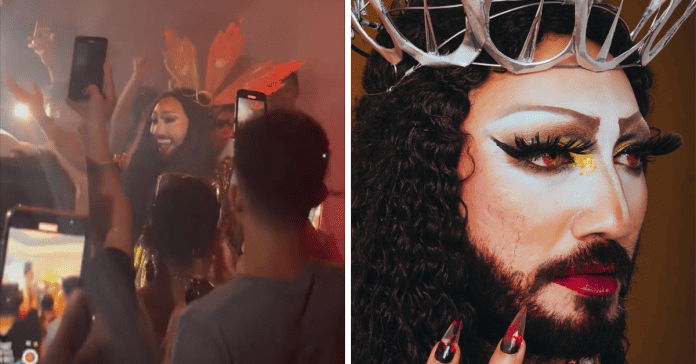“Thank you for coming to church!”
This was former Drag Den Philippines contestant Pura Luka Vega’s caption in a tweet together with a video of her drag performance where she was dressed in Jesus’ costume, while jamming with a crowd to the Catholic Mass worship song Ama Namin.
The video was uploaded on Sunday, July 9, as a response to her follower who praised her drag performance that day with a photo of Jesus Christ’s sculpture seated in front of a mixing station.
The drag queen’s performance included a punk rock version of Ama Namin, which had a crowd of people partying and singing to the remixed worship song as they held up their phones to capture the “event.”
Pura Luka Vega thanked the people for coming to “church”.
The drag performance sparked a divided and heated discourse between those who condemned the drag performance and the crowd as “blasphemous” and “disrespectful to the Catholic church,” and those who defended the drag community in the video and their “expressions of art”.
“While it is true that drag is a form of expression, it’s art, it’s political & a good source of entertainment, this one is a big NO for me. As a devout Catholic, I find this very disrespectful. ???,” a netizen tweeted with a close-up video of Pura Luka Vega’s performance.
“Prayer is not entertainment. The mass is not a costume party. The church is not a club,” a netizen commented on Pura Luka Vega’s video.
“No. As a Catholic, this is not acceptable to me. And don’t BS me by saying this is not offensive. It is to me. Respect ang hinihingi di ba? Then do not go over-bound disrespecting a solemn prayer/song by doing this. It’s not a party song! And Jesus shouldn’t be cosplayed!,” a Catholic netizen said.
“If you find it offensive when a straight man dresses and acts like a queer, why do you condemn the faithful who felt offended by this video because it mocks their God? Even if I love drag, I myself cannot finish watching this video because I find it blasphemous,” another netizen commented.
“We know this is offensive to religious pips, so why do we resort to this kind of entertainment? I know they have offended us many times due to their religion, but aren’t we doing the same with this kind of gesture? Those people will hate us more, instead of them listening to us,” the netizen said.
“This will give them more reason to hate us. Some of us are trying to lessen the gap between us and them, but this act will further isolate us from them. They will hate us even more. This is no progress.”
A netizen even mentioned a law regarding blasphemous acts: “This is too much. Demanding respect yet disrespecting what others hold sacred. Also, lest these people forget, there’s a crime called offending religious beliefs under article 133 of the Revised Penal Code.”
According to the Senate, the Philippines currently has a law against blasphemy stated under Section 4, Article 133 of the Revised Penal Code that covers “Crimes against religious worship,” including a ban on “offending religious feelings”.
But other netizens were quick to state that Article 133 specifies that a blasphemous act must be done in places of religious worship and celebrations in order for it to be counted as a crime.
“Drag is art. Art is expression. This is freedom of expression. Uncomfortable? Good. That’s what art is supposed to do. Make people uncomfortable,” a drag enthusiast said.
“[P]asabog pinag-simba ni [P]ura ang mga bakla complete with tips na offertory[.] [A]lalahanin ninyo! [S]inging is twice praying! [M]agpasalamat pa dapat si [P]ope kay [P]ura! at alalahanin ninyo ang kinikilala nyong depiction ni papa susej ay hindi naman talaga nya tunay na itsura!,” Tiktoker Allan Soriano, popularly known as itsacslife, voiced his opinion.
“[T]his drag performance of Pura single-handedly exposed the thinly-veiled internalized homophobia within the community and its many expressions ???,” a netizen called out to people who were criticizing the drag performance.
Pura Luka Vega responded to the flak via Twitter Space. Titled “Breaking my silence,” it gained over 35,000 online listeners.
The drag queen thanked the people who understood her performance and expressed her willingness to explain to those who did not get its message.
“Queerness has always been there naman I feel like it’s my way of actually praising God,” she said.
Pura Luka Vega pondered if her drag performance made offense whether because she was a queer individual or due to other factors.
“Feeling ko I was very careful when I did that ’cause I don’t want it to come across as something very offensive but then again it’s still taken that’s something very offensive,” she aired.
Pura Luka Vega said that it was not her intention to “demean” the religion and that she, too, was a Roman Catholic.
“I did that intentionally to challenge our emotions of how we worship or how we sing our praise,” Luka explained, adding that she was happy that people sang the Lord’s Prayer with her as she believed they expressed their faith through her performance.
As of writing, Ama Namin and Catholic are listed among The Philippines’ trending topics on Twitter.
Pura Luka Vega joined the first season of Drag Den Philippines as a contender along with eight other drag queens. She was the first bearded drag queen to ever join a Filipino drag show.
